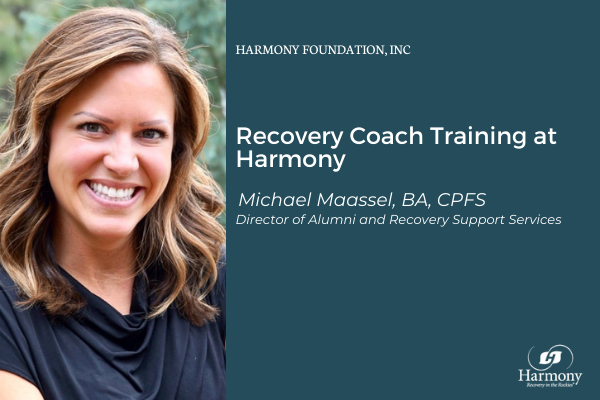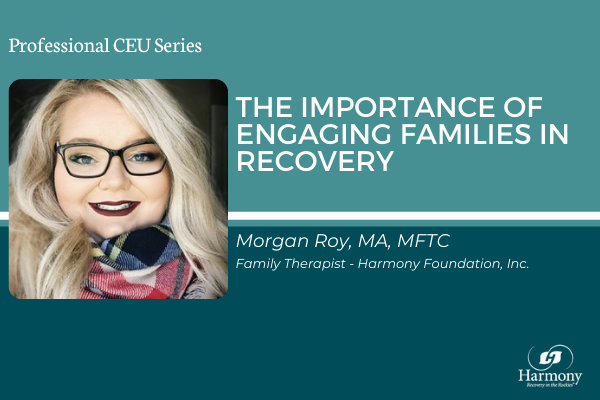Recovery coaches can be a crucial element in a recovery journey. They may not offer primary treatment for addiction, do not diagnose, and are not associated with any particular recovery method. But they offer critical support and facilitate positive change—especially in early recovery.
“Our job is to promote recovery; it’s about being recovery positive,” says recovery coach Michael Maassel, the Director of Alumni and Recovery Support Services at Harmony Foundation. “A recovery coach is that sweet spot between a therapist and a sponsor because we have training but do not require a license. We’re trained to operate on a peer-to-peer level.”
According to addiction expert William White, recovery coaches provide:
Emotional support: demonstrations of empathy, love, caring, and concern in such activities as peer mentoring and recovery coaching, as well as in recovery support groups.
Informational support: provision of health and wellness information; educational assistance; and help in acquiring new skills, ranging from life skills to skills in employment readiness and citizenship restoration.
Instrumental support: concrete assistance in task accomplishment, especially with stressful or unpleasant tasks such as filling out applications and obtaining entitlements, providing child care, or providing transportation to support-group meetings and clothing assistance outlets.
Companionship: helping people in early recovery feel connected and enjoy being with others, especially in recreational activities in alcohol- and drug-free environments. This assistance is particularly crucial in early recovery when little about abstaining from alcohol or drugs is reinforcing.
Similarly, Michael Maassel lists four main tasks for recovery coaches:
- Promote recovery
- Remove barriers
- Connect people with support services
- Encourage hope, optimism, and healthy living
Being recovery positive means convincing people that “recovery is great, that it allows you to be present so that people with addiction are actually convinced that they could live a sober life,” she says. It’s a cheerleading function: people with addiction frequently need to be persuaded that recovery is really worth it, that sobriety is more appealing than active addiction, i.e., misusing drugs and alcohol.
The second task of the recovery coach is removing barriers. “This is huge,” says Maassel. “Somebody comes to you saying ‘I can’t get sober,’ or ‘I don’t have people who believe in me,’ or ‘I live at this end of town, how am I supposed to get to the other end of town?’ Recovery coaches make it happen: ‘You don’t have a car, let’s get you a bus pass. You have money but no ride, let’s get you an Uber.’ Or we help them get involved in a group that can help them to get from point A to B.”
Recovery coaches listen with empathy and without judgment. “If they say ‘I can’t get sober,’ we ask them why they think that. Maybe they feel they have to do it a certain way because that’s what they have been told. Then it is for us to open their eyes and let them know that there’s not just one way to recovery. So, we’re removing that particular barrier.”
Recovery coaches try to remove roadblocks as much as they can. “If they say ‘I don’t have anybody to support me,’ we say, ‘You already have one person. I support you!’ But we also make sure we are not the only support avenue.
“We connect people with recovery support services, build up their resource bank, their recovery capital, their toolbox. We let them know it’s not just us they can rely on. We connect them with whatever services they may need or prefer, whether that’s 12-Step facilitation such as AA or NA, SMART Recovery, Recovery Dharma, or residential treatment.”
“We don’t want them to be singularly dependent on just one avenue because what happens if that avenue goes away,” explains Maassel. “We’re about diversifying their recovery. If something goes wrong with one avenue, they still have others. They should have no reason to say ‘no’ to their recovery.”
And finally, recovery coaches encourage hope, optimism, and healthy living. “Sometimes, a recovery coach may be the only person that gives them that hope. Recovery is a journey—there is no destination to reach—and it’s our job to move them forward. It can be a tough journey, and when they are down and out at times, it’s up to us to be there and support them.”
If you are interested in helping people sustain their recovery from addiction, Harmony Foundation is offering training for recovery coaches.
Who can be a recovery coach?
- Credentialed addiction professionals
- Treatment center support staff, volunteers, and alumni
- Staff from behavioral health and government agencies
- Representatives from inpatient and outpatient centers and sober living homes
- Individuals, family members, and advocates of recovery
The CCAR Recovery Coach Academy© is a 4-day intensive training program focusing on providing participants with the skills needed to guide, mentor, and support anyone who would like to enter into or sustain long-term recovery from an addiction to alcohol or drugs. The next program is scheduled to begin on August 5th, 2021.












